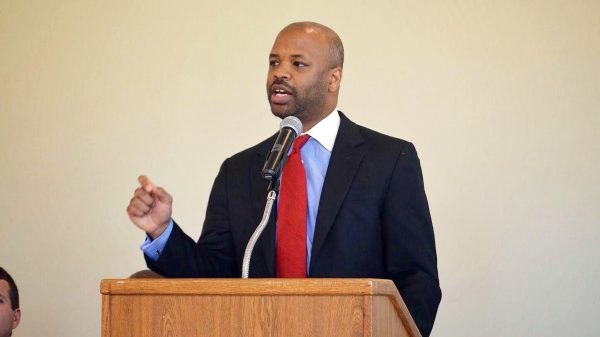By Brandon Moseley
Alabama Political Reporter
On Thursday, July 31, the Alabama Policy Institute (API) held a special panel discussion to discuss how to deal with Alabama’s prison crisis.
For a long time, the State of Alabama has addressed crime problems by sending more and more of its criminal population to prison for longer and longer sentences. The problem the State has found is that 99% of them will return one day to the Alabama population and 60% of them that do will commit more crimes and will return to the prison population again. This cycle is costly and could get a lot costlier if the Federal court system gets involved and finds that Alabama is in violation of Federal statutes and orders the State to spend more money on maintaining its prison population.
Alabama Governor Robert Bentley (R) has appointed the Alabama Prison Reform Task Force to look at the prison issue and suggest policies to deal with the struggling prison system which is currently at 190 percent of its capacity. The Chairman of the Alabama Prison Reform Task Force is Alabama State Senator Cam Ward (R) from Alabaster. Sen. Ward represents the 14th District, which includes parts of Shelby and Bibb Counties. Ward is also the Chairman of the Senate Judiciary Committee. Sen. Ward was part of the three person panel discussion titled, “A State in Shackles.”
Joining Ward on the API panel was fellow Alabama Prison Reform Task Force member Katherine Robertson. Robertson is presently the senior policy counsel for the Alabama Policy Institute and previously worked for the Department of Justice under the Bush administration as well as the Senate Judiciary for Senator Jeff Sessions (R) from Alabama. Rounding out the panel was Dr. John Sloan, a Professor of Criminal Justice at UAB. He has also worked as a consultant to the Jefferson County Sheriff’s Department, the Birmingham Police Department and the Jefferson County family court.
The discussion was moderated by Cliff Sims, who is the publisher and editor of the conservative blog site: ‘Yellow Hammer News.’ The “State in Shackles” event was held in honor of conservative economist Dr. Milton Friedman.
Senator Cam Ward said that how the state got here was quite simple: politicians ran for office on a ‘get tough on crime’ bumper sticker slogans so they increased the penalties for more and more crimes and they did not invest in long term infrastructure to handle the growing prison population. “No one was ever elected on the slogan I am going to fix the prisons.”
Katherine Robertson said that as we increased the penalties in the tough on crime phase of the 1980s and 1990s we did not look at the data to determine whether the tougher penalties worked or not.
Dr. Sloan said, “I have been in Alabama at UAB for 26 years and in that time nobody has ever been elected saying I am soft on crime.” Dr. Sloan said that there has been a politicization of crime. People have favored locking more people up for longer periods of time, “99 percent of the folks we lock up are coming back and we need to make sure that the people coming back are not worse than they were when they went in.” Sloan said that we have a history of not caring whether they are better or worse when they come back. Currently we have a 60% recidivism rate in Alabama.
Cliff Sims said that many of the schools in our inner city areas are prisoner factories. How much of our crime problems can be attributed to the broken education system?
Katherine Robertson said that 60 percent of Alabama inmates don’t have a high school diploma or a GED. Numerous studies have shown that with no education and no job skill that inmates returning to society can’t find a job. Alabama does provide some educational opportunities. Prisoners can get a GED and can get some college credit, but those opportunities are still limited. “How do you convince the public that tax dollars should be sent educating prisoners?” Missouri did a study and found out they could save $1.5 million a year just by dropping recidivism 15 percent.
Sen. Ward said that prisoner who get a skill while in prison are 43% less likely to return than those who don’t. “Having a skill and a trade is essential. If you don’t have that skill you are coming back.” Ward said that prison education will save us so much money in the long run because you will reduce recidivism. Currently the state only spend $5 million out of a $5.8 general fund budget on prisoner education. The St Clair Correctional Facility has an effective one. It trains prisoners to be masons, electricians, and other skills. Tutwiler trains prisoners how to work in manufacturing and teaches cosmetology; but because the state does not provide much money for that there are not the same opportunities across the state.
Dr. Sloan said the question that people ask is, “What do the least deserving among us deserve?” Do we educate this robber? “The answer is that the least deserving among us don’t deserve anything.” That has been the view of the state of Alabama, but this view costs us so much more, because they will get out and they will reoffend. The state provides a cell with iron bars and nothing more. This has been the context for over 30 years.
Sen. Ward said that he has colleagues who ask him why are you touching this? It is political suicide? This problem is going to get fixed. Either we are going to do it or a federal judge is going to order us to do it. 65 percent of the state’s general fund budget is spent on prisons and Medicaid (Alabama is unique in that we have a larger separate budget for education). The state is under a lot of budgetary constraints and now faces the potential of a federal judge ordering a mass release of inmates. Lock them up and throwing away the key is costing us so much money. It would cost us $610 million to build our way out of this by building new prisons.
Dr. Sloan said that when you fail to provide the basic necessities to inmates what you get is litigation which can be drawn out for years. How much dough are we going to have to spend defending this in federal court? You are wasting money
Sloan said that the state trains women at Tutwiler prison to be cosmetologists but they are prohibited by law from being cosmetologists. There is a lot of focus on disenfranchisement for inmates but that is only part of the punishment you receive for being incarcerated. What about all the other things? The occupations that felons are not allowed to apply for, they can’t serve on a jury, etc. The first question on a job application is: Have you ever been convicted of a felony? When they mark down yes, in the real world that application goes in the garbage can.
Dr. Sloan said that the problem is cultural. When the inmate presents themselves at the job interview presumption precedes the inmate at the job interview. There are success stories of felons who rehabilitated. It is not just all failures, but we have not made the investment in rehabilitation.
Katherine Robertson said that community corrections and re-entry transition are areas where Alabama is still lagging. Two dozen counties still do not have a community corrections program. Some states even provide newly released felons with a place to live. “We haven’t totally bought into this.”
Dr. Sloan said that the state of Alabama is setting prison releasees to fail. They can’t get to the services that they are being mandated to receive. “How likely are they to have a car and a drivers license?” The state also does not have good public transit for them to get to where they are required to go much less get a job. “You have created a system where you are setting them up to fail.”
Cam said that community corrections cost just $11.50 a day per prisoner. “We make it extremely difficult for an inmate to get a driver’s license.” How are they going to get a job without a car and a drivers license. A lot of them are not well educated to begin with so they can’t even understand the process to get a drivers license. “How do they even get to the DMV to get it?”
Senator Ward said that part of what the state needs to do is look at expungement of criminal records; but stressed that there are limits. In the case of white collar crime there are a lot of people who are very good at scamming people out of their money. Financial institutions should be able to see that person’s criminal record and a daycare owner should have a right to know if you were a child molester.
Ward said that the state looked at private prisons during the Riley Administration. It cost us $51 a day to ship them to Louisiana where we were already spending $42 a day. The private environment actually cost the state more.
Dr. Sloan said that privatization leads to a prison industrial complex similar to the relationship between the Pentagon and defense contractors. An example being the Corrections Corporation of America based in Tennessee. Sloan said he has concerns about turning our prisons over to these corporations and said that all the data he has seen shows that the results are abysmal. He said he is not averse to the concept but urged caution.
Robertson said that is great for Alabama that Texas went ahead of us with their prison reform so we can follow their model. Governor Rick Perry (R) got every stake holder in the room and reached a comprehensive bill. Building more prisons in the long run is unsustainable. It is a lot cheaper to have a person on parole or probation. “The goal is public safety at an affordable price.”
Ward said that we can go pick the best elements from what states like Texas, North Carolina, Idaho, and Georgia had done. “We don’t have to reinvent the wheel.”
Dr. Sloan says part of the problem is that it has been seen by many politician to be political death to treat prisoners easier.
Ward said we don’t want to do what Mississippi tried a few years ago. A Republican legislature set a minimum prison sentence for each crime and said they would build however many prisons they needed. They made the prison population go through the roof and had to totally revise their prison system.
Ward said the state needs more drug courts like Jefferson County has, more mental health courts, and we need to reform the three strikes and you’re out law. Some states have A B C D E F and even G felonies. Alabama just has ABC and any felony counts toward the three strikes and you’re out. We may need to create a class D that does not apply to the Habitual Offender Act. “Habitual offender act is not working.”
Ward says to his colleagues in the Senate “You can’t always worry about the elections.” He has taken up prison and sentencing reform and, “It didn’t hurt me.” I was just re-elected without opposition.
Sloan said that alcohol and drug abuse is a gigantic portion of our crime problem.
Ward said that over 53% of our inmates have a mental health issue. For somebody with mental problems often also with a drug problem the deterrent of a long potential prison sentence does not help them not commit the crime.
Robertson said that our drug court system in Alabama is not that bad we just don’t have enough of them.
Sloan said that Jefferson County has one of the best drug courts in the country
One audience member asked Senator Ward about decriminalizing drugs in the state of Alabama.
Senator Ward said that he has to convince 34 other State Senators and a majority of the House to adopt the prison task force’s recommendations, everything I say after legalizing pot would be gone out their ear.
The Alabama Political Reporter asked the panel, You have told us that 60 percent of the inmates have no meaningful education, 52% have mental illness, and 85 percent of them committed their crimes while under the effects of alcohol and/or drug addiction. Many of the solutions suggested here today will work in ten or fifteen years time, but the federal government is going to want a solution soon, perhaps within months. You are not going to get the prisoners college degrees, treat their drug addictions, and cure their mental illnesses all in the next six months, wouldn’t a better solution be in the short run to float a $600 million bond issue to build new prisons and pay for it with $60 million a year in new cigarette and alcohol taxes rather than turning loose thousands of these people back into our communities knowing that they have a 60 percent recidivism rate?
Sen. Ward said I don’t think the public will support a $600 million bond issue. We had a $billion bond issue to fix all the roads and that was voted down. Ward said that he has colleagues who want to bring a bond issue before the voters and tell them to pass it or we release thousands of prisoners: your choice. I don’t agree with that.
Senator Ward said that it is critical that prison reform passes in the 2015 legislative session. Then even if there is an order from a federal judge that state can go to the court and present their plan for fixing the situation. Ward acknowledged that there would have to be a construction element to that plan.
Dr. Sloan said that the problem with building more prisons is that when you build a new facility more people go to prison and very shortly after that it is at capacity or beyond.
Dr. John Hill is the Senior Research Analyst at the Alabama Policy Institute. Dr. Hill said that Thursday forum was part of the 2014 Friedman Legacy Day. Dr. Milton Friedman worked at the University of Chicago for more than 30 years and his book ‘Free to Choose’ about free market economics was a best seller. Friedman won the Nobel Peace Prize for his work in economics and was an economic advisor to President Ronald Reagan. This would have been Dr. Friedman’s 102nd Birthday and the API staff provided cookies, finger sandwiches and birthday cake in honor of the accomplishments of Dr. Milton Friedman.




















































